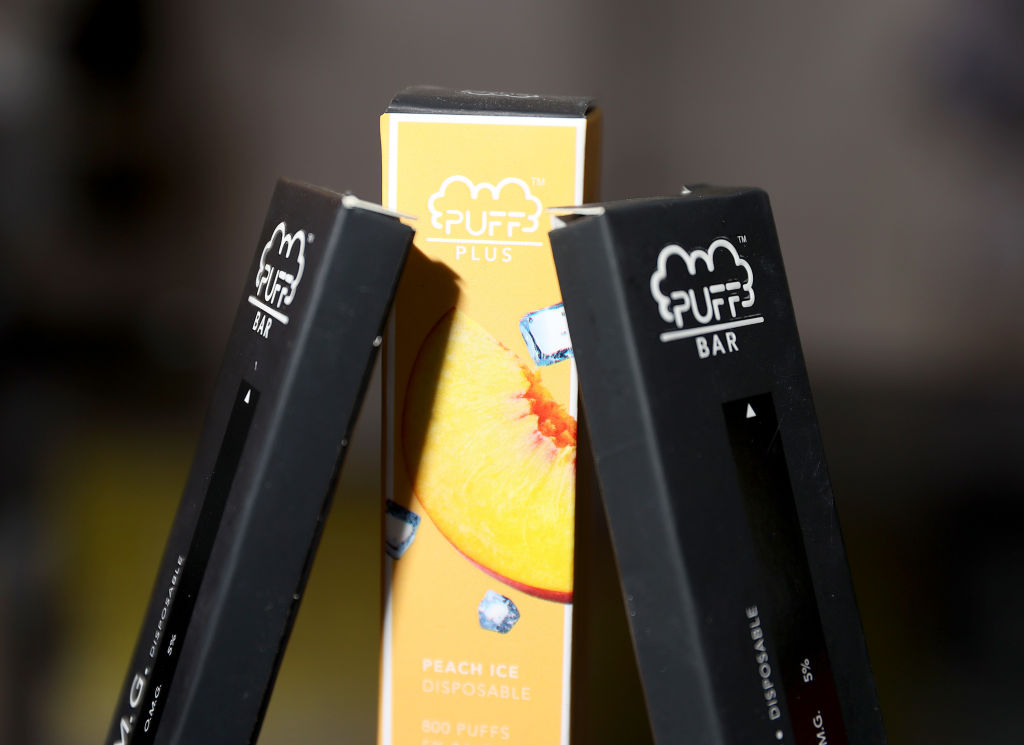
The U.S. Food and Drug Administration (FDA) can now regulate e-cigarettes that contain synthetic nicotine, a shift that could slash the number of vaping products available in the U.S.
A spending bill, which Congress passed on March 10 and President Joe Biden is expected to sign on March 11, expanded the definition of an FDA-regulated “tobacco product” to include those that use lab-made nicotine, as well as traditional tobacco-derived nicotine. That update—while small on paper—could dramatically change the U.S. vaping industry, potentially taking market-leaders like Puff Bar, as well as products from smaller brands, off store shelves.
Under a policy finalized in 2016, new e-cigarettes cannot be sold in the U.S. until their makers prove to the FDA that their products do more good than harm to public health. That calculation often comes down to the benefits they provide adults who want to stop smoking cigarettes versus their possible health risks and contributions to youth vaping.
E-cigarettes introduced before the FDA’s rule was enacted had to retroactively file applications by September 2020. The agency was supposed to decide which brands met its public-health standard by September 2021, but—six months later—it still has not reached decisions for big-name brands including Juul. In October, R.J. Reynolds’ Vuse Solo became the first e-cigarette to clear the FDA’s process.
The FDA has so far denied or refused to review applications for more than 5 million vaping products. Rather than taking their products off the market, some of those companies—many of which were smaller operations making e-liquids for refillable vaping devices—used synthetic nicotine as a lifeline, replacing traditional nicotine with the lab-made version to stay outside FDA regulation. Now, though, that loophole is closing, meaning many products cannot continue to be sold.
In addition to the smaller companies likely to be affected by the change, Puff Bar, a popular brand of disposable e-cigarette, could be the biggest casualty. The FDA ordered it to stop selling its vapes in 2020, since it did not follow the agency’s application process. It later reemerged with a formula using synthetic nicotine and, as of a 2021 U.S. Centers for Disease Control and Prevention study, was the go-to brand for 26% of high school vapers. With synthetic nicotine no longer a viable workaround, the company’s fate is once again uncertain.
In the polarized world of e-cigarettes, reactions to the FDA’s new power have been predictably split.
Some in the vaping industry slammed the FDA for shrinking the number of cigarette-alternatives available in the U.S. “This bill ought to be called the Cigarette Protection Act, because the indisputable outcome will be countless more Americans pushed away from nicotine vaping and back into combustible smoking,” Amanda Wheeler, president of the American Vapor Manufacturers Association, told Filter.
But large e-cigarette companies, including Juul, support the regulation of brands making synthetic nicotine products—some of which are among Juul’s biggest competitors. In a previous statement, a Juul spokesperson said that “illegally marketed and illicit products and products designed to evade federal and state oversight undermine harm reduction and a responsible e-vapor category.”
On that front, Juul and public-health groups are in rare agreement. The Campaign for Tobacco-Free Kids applauded Congress for taking steps to curb youth vaping—a habit 11% of high school students reported in 2021, down from a high of 27.5% in 2019.
“By stopping manufacturers from using synthetic nicotine to evade FDA regulation, Congress is taking a critical step to end this youth addiction crisis once and for all,” a spokesperson said in a statement.
More Must-Reads from TIME
- Donald Trump Is TIME's 2024 Person of the Year
- TIME’s Top 10 Photos of 2024
- Why Gen Z Is Drinking Less
- The Best Movies About Cooking
- Why Is Anxiety Worse at Night?
- A Head-to-Toe Guide to Treating Dry Skin
- Why Street Cats Are Taking Over Urban Neighborhoods
- Column: Jimmy Carter’s Global Legacy Was Moral Clarity
Write to Jamie Ducharme at jamie.ducharme@time.com